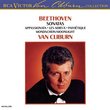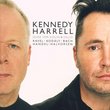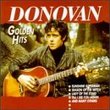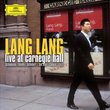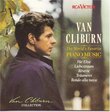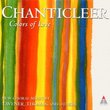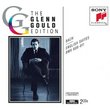| All Artists: Gilles Cachemaille, Frank [1] Martin, Armin Jordan, Christiane Jaccottet, L'Orchestre de la Suisse Romande, Ursula Ruttimann Title: Frank Martin: Petite Symphonie Concertante Members Wishing: 0 Total Copies: 0 Label: Erato Release Date: 5/20/2003 Genres: Pop, Classical Styles: Vocal Pop, Forms & Genres, Concertos, Symphonies Number of Discs: 1 SwapaCD Credits: 1 UPC: 809274868725 |
Search - Gilles Cachemaille, Frank [1] Martin, Armin Jordan :: Frank Martin: Petite Symphonie Concertante
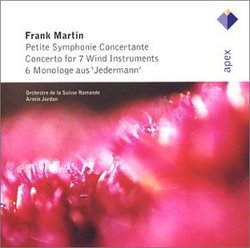 | Gilles Cachemaille, Frank [1] Martin, Armin Jordan Frank Martin: Petite Symphonie Concertante Genres: Pop, Classical
|
Larger Image |
CD DetailsSimilarly Requested CDs
|
CD ReviewsA valuable bargain-priced guide to this edgy Swiss R. J. Stove | Gardenvale, Victoria Australia | 05/16/2004 (4 out of 5 stars) "Nicholas Deutsch's review, elsewhere on Amazon.com, seems a thoroughly judicious assessment: though I find Cachemaille's black-marble bass-baritone timbre more impressive (at all volume levels) than he does, and the CONCERTO's invention less so. Armin Jordan's direction is as meticulous in that piece, and displays as keen a judgement of tonal balance, as always. Those who know the work merely from Ernest Ansermet's boisterous and, in all conscience, fairly unkempt early-stereo version will be surprised to discover how much fine detail comes through here. I just wish the music itself - dating from 1949 - did not sound so often like a tired re-run of the mighty 1945 PETITE SYMPHONIE CONCERTANTE, although the bell-like tolling of the CONCERTO's central funeral march represents Martin near his best, and the finale's beery trumpet flourishes indicate a sardonic amusement not often associated with this edgy Swiss. Had I been laying down the law in the present CD's production process I should have jettisoned the CONCERTO in favor of POLYPTIQUE, Martin's jolting meditation (for solo violin and string orchestra) on Christ's Passion. This Spaetlese, which seems to acquire a new force and strength in the age of Mel Gibson, dates from 1973; it confirms that age did not weary the 83-year-old Martin, nor custom stale his considerable - if not exactly infinite - variety. Still, at least we have here the ever-haunting JEDERMANN MONOLOGUES, some of the most somber inspirations that vocal music of the last 100 years can show, but also some of the most noble. They breathe the same air as Brahms's FOUR SERIOUS SONGS, though this air has understandably become more oppressive with the horrors of the 20th century, horrors which impinged with particular sharpness upon Martin's icily yet desperately religious temperament. As for the PSC itself, Jordan's interpretation is more sober and less dramatic than some; it lacks the venomous malice that older conductors have conveyed, and has a statuesque quality that I have ended up rather relishing, with attention paid to all sorts of string filigree that more violent performances overlook altogether. Good if needlessly brief annotations, full JEDERMANN texts, expert engineering (the PSC notoriously abounds in balance problems, tackled here with above-average skill), and a scarcely believable bargain price: you cannot go seriously wrong with this reissue." Fine Modern Versions of 3 Outstanding Martin Works Nicholas A. Deutsch | New York, NY USA | 01/28/2004 (5 out of 5 stars) "The 3 works here, 2 for orchestra & one for baritone & orchestra, are among the finest by the great Swiss composer Frank Martin (1890-1974). They all date from the 1940s, when - after many years of hard work - he had finally achieved his highly individual mature style, particularly in matters of harmony. His most famous work, the "Petite Symphonie Concertante" for the unique combination of harp, harpsichord, piano & double string orchestra, remains as fresh & exhilarating as the day it was first performed; the "Concerto for 7 Wind Instruments" never ceases to delight in the ingenious, expressive ways Martin uses his soloists, separately & in various combinations. The "Six Monologues from 'Everyman'" - settings for voice & orchestra of excerpts from Hugo von Hofmannsthal's modern version of the medieval religious drama - is one of the 20th century's most moving song cycles, & has been performed and/or recorded by numerous well-known (bass-)baritones, including Dietrich Fischer-Dieskau, Heinz Rehfuss (both with Martin), Theo Adam, Jose van Dam, David Wilson-Johnson, Matthias Goerne, Hakan Hagegard & Thomas Quasthoff; there is a searing recent recording of the original piano version by Roman Trekel on Berlin Classics. These performances are expertly conducted by Armin Jordan, very well-played & recorded; I think they'll hold up well over time. The "Petite Symphonie Concertante" is the pick of the lot - nice to have Christiane Jacottet, who once recorded Martin's Harpsichord Concerto under the composer, as one of the soloists - : shrewdly paced & with exceptionally well-judged recording balance. Some of the solo parts in the Concerto have been played with more assertive sense of character elsewhere, but the teamwork here is just fine, & again Jordan judges the "build" of the piece expertly. He also resists the temptation of equating "spiritual" with "slow" in the Monologues - not all conductors do. My only reservations have to do with baritone Gilles Cachemaille. He certainly sings beautifully & with great sincerity, but (as elsewhere) I find his voice when at "average" volume oddly inexpressive, if pleasant in timbre; as soon as the line rises in pitch & volume the performance comes to life. But if this is not the most emotionally heart-piercing version of the piece, it is still very good. And overall, if you're looking for good modern versions of these 3 works, or are just curious about Martin's music, this is a real bargain. (Note: These performances were previously issued on Cascavelle, at a considerably higher price. But although this is a "bargain" re-issue, it still comes with full text & translation for the song cycle - thanks, Warner Classics!)" Golden Means Giordano Bruno | Wherever I am, I am. | 08/17/2008 (5 out of 5 stars) "Frank Martin (1890-1974) was one of the few 20th C composers who could write almost entirely within the harmonic and structural idiom of European classicism without sounding corny or cozy. His musical goals were always golden proportion and sober emotionalism rather than shock-value originality. The three compositions on this CD, all written in the 1940s, are a fine sampling of his art.
The Petite Symphonie Concertante, scored for two string choirs, piano, harpsichord, and harp, demonstrates Martin's superb control of the primary values of symphonic composition -- melody, rhythmic development, and orchestral color. The third movement especially reminds me of Prokofiev; Martin lacks the sardonic wit of Prokofiev but compensates with sustained intelligence. The Six Monologues for bariton voice and orchestra, using texts by Hugo von Hofmannstal, are sung vigorously and movingly by Gilles Cachemaille. These intensely religious songs might well be compared to the Barefoot Songs of Swedish composer Allan Pettersson. In fact, Martin often reminds me of Pettersson, though he's easier to appreciate -- less consistently bleak, without the Swede's Kierkegaardian singularity, but with his own memorable melodic serenity. The Concerto for Seven Instruments and Percussion also elicits a comparison, to similar ensemble pieces by the mature Leos Janacek. I've performed the bassoon part in this piece; it's magnificent fun to do, and if you listen intently, you'll hear the pleasure in the playing of these seven wind-instrument virtuosi from the Orchestre de la Suisse Romande. I've compared Martin to three of my favorite 20th C composers - Prokofiev, Pettersson, and Janacek - not only because of noted similarities but also because I suspect Martin is a composer of the same rank, though I've heard considerably less of his music." |

 Track Listings (12) - Disc #1
Track Listings (12) - Disc #1